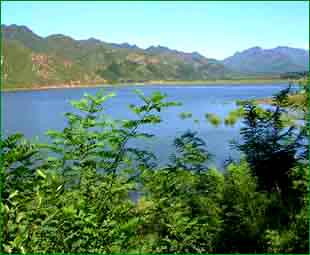| Home / Environment / Photo News | Tools: Save | Print | E-mail | Most Read |
| Beijing Gets Poor Grades for Water Quality |
| Adjust font size: |
The water quality in 50 percent of Beijing's lifeline lakes failed to make even Grade V, the minimum standard for water uses for agricultural or landscaping purposes, according to a report released by the Beijing Municipal Environmental Protection Bureau on Monday.
Only two of the city's 16 major lakes Tuanchenghu and Zhanlanguan Back achieved Grade II which is the minimum acceptable level for daily use. Though the water quality at the city's 21 local reservoirs was reported to be mainly Grade II level four of those have dried up due to severe water shortages. Local rivers were no better. Eight of the major rivers winding through the eight districts of central Beijing are heavily polluted and fail to meet the Grade V standard. "The quality of our water is in need of attention," one expert said. Protecting the city's water resources and controlling pollution would require a systematic effort to both reduce emissions and encourage the growth of appropriate vegetation, said experts. "The first step is to control or renovate the most polluting industries. We must also do more to reduce the amount of sewage released into our water," said Ma Jun, director of the Beijing-based Institute of Public and Environmental Protection, an NGO that researches water pollution. Statistics show that Beijing discharged more than 1 billion tons of sewage last year. That figure represented 882 million tons of residential waste. The rest was industrial. Water shortages in recent years and the growth in the capital's population have also contributed to the deterioration of local water quality even as the city has tried to keep up by building new sewage-treatment plants. Ma said the city should not pin its hopes on the South-to-North Water Diversion Project which will bring water from South China's Yangtze River to Beijing by 2010. "The project will bring a certain amount of fresh water to the city though not much. At the same time the amount of sewage we discharge will also climb as the city expands," he said. "Water conservation and the utilization of recycled water should always be emphasized," Ma observed. Xie Yan, director of the Wildlife Conservation Society China Program, said planting appropriate vegetation could help conserve water in Beijing. "Without the reservation and filtration functions performed by vegetation it will be impossible to manage water pollution in Beijing," she told China Daily. "Some kinds of vegetation such as poplar trees suck up lots of water. Shrubs function better in terms of water conservation." However, there are many parklands, trees and gardens in Beijing. "Water will be the most precious resource in the coming years," she added. "Efforts to increase conservation and controlling water pollution must take so many factors into consideration. The government needs to work on a sustainable program and it needs more supporting funds," she said. (China Daily November 29, 2006)
|
| Tools: Save | Print | E-mail | Most Read |
 |
| Related Stories |
